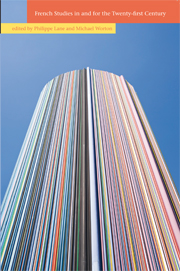Book contents
- Frontmatter
- Contents
- Notes on Contributors
- Foreword by Baroness Jean Coussins
- Foreword by His Excellency Bernard Emié
- Part I Contextualisations
- Part II Research and Public Engagement Strategies
- Part III The Place of Women and Gender in French Studies
- Part IV The Place of Literature
- Part V The Place of Linguistics in French Studies Today
- 12 French Linguistics Research and Teaching in UK and Irish HE Institutions
- 13 The Rise of Translation
- Part VI Theatre, Cinema and Popular Culture
- Part VII Area Studies, Postcolonial Studies and War and Culture Studies
- Part VIII Adventures in Language Teaching
- Appendices. Addresses to the Future of French Studies Conference
- Index
12 - French Linguistics Research and Teaching in UK and Irish HE Institutions
from Part V - The Place of Linguistics in French Studies Today
- Frontmatter
- Contents
- Notes on Contributors
- Foreword by Baroness Jean Coussins
- Foreword by His Excellency Bernard Emié
- Part I Contextualisations
- Part II Research and Public Engagement Strategies
- Part III The Place of Women and Gender in French Studies
- Part IV The Place of Literature
- Part V The Place of Linguistics in French Studies Today
- 12 French Linguistics Research and Teaching in UK and Irish HE Institutions
- 13 The Rise of Translation
- Part VI Theatre, Cinema and Popular Culture
- Part VII Area Studies, Postcolonial Studies and War and Culture Studies
- Part VIII Adventures in Language Teaching
- Appendices. Addresses to the Future of French Studies Conference
- Index
Summary
Introduction
The research and teaching of French linguistics in UK higher education (HE) institutions have a venerable history; a number of universities have traditionally offered philology or history of the language courses, which complement literary study. A deeper understanding of the way that the phonology, syntax and semantics of the French language have evolved gives students linguistic insights that dovetail with their study of the Roman de Renart, Rabelais, Racine or the nouveau roman. There was, in the past, some coverage of contemporary French phonetics but little on sociolinguistic issues. More recently, new areas of research and teaching have been developed, with a particular focus on contemporary spoken French and on sociolinguistics. Well supported by funding councils, UK researchers are also making an important contribution in other areas: phonetics and phonology, syntax, pragmatics and second-language acquisition. A fair proportion of French linguistics research occurs outside French sections in psychology or applied linguistics departments. In addition, the UK plays a particular role in bringing together European and North American intellectual traditions and methodologies and in promoting the internationalisation of French linguistics research through the strength of its subject associations, and that of the Journal of French Language Studies. The following sections treat each of these areas in turn.
History of the French Language
There is a long and distinguished tradition in Britain of teaching and research on the history of the French language, particularly, but by no means exclusively, at the universities of Cambridge, Manchester and Oxford.
- Type
- Chapter
- Information
- French Studies in and for the 21st Century , pp. 141 - 154Publisher: Liverpool University PressPrint publication year: 2011



